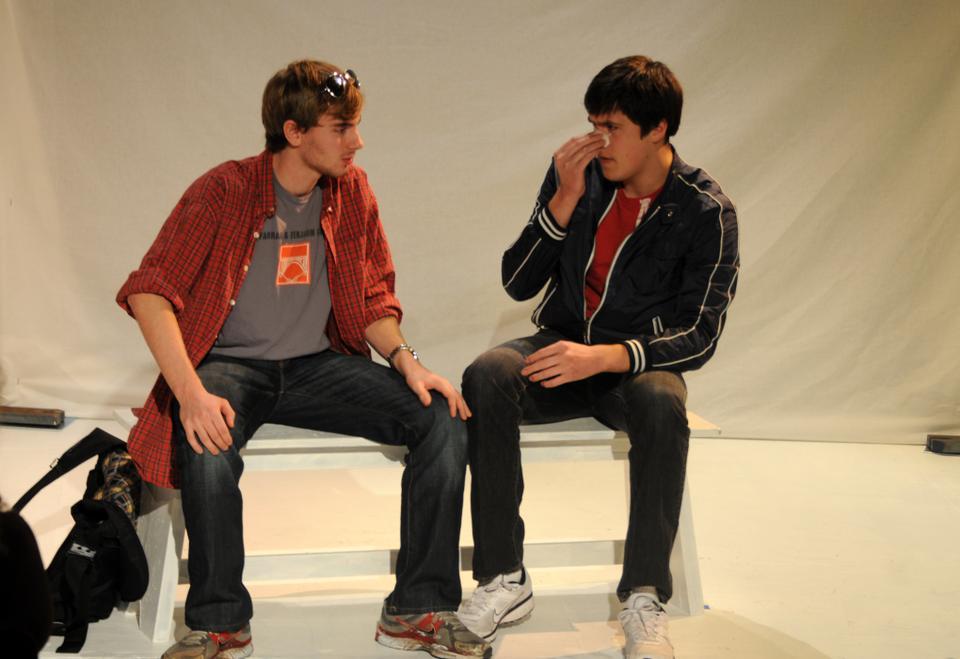
News
Summers Will Not Finish Semester of Teaching as Harvard Investigates Epstein Ties

News
Harvard College Students Report Favoring Divestment from Israel in HUA Survey

News
‘He Should Resign’: Harvard Undergrads Take Hard Line Against Summers Over Epstein Scandal

News
Harvard To Launch New Investigation Into Epstein’s Ties to Summers, Other University Affiliates

News
Harvard Students To Vote on Divestment From Israel in Inaugural HUA Election Survey
‘Shapes’ Grounded by Electric Acting
Production takes minimalist approach to LaBute’s musings on art and identity

Finding a balance between black comedy, philosophical musings, and high character drama is a challenge faced by every production of Neil LaBute’s multi-layered plays. The Harvard-Radcliffe Dramatic Club’s production of “The Shape of Things,” directed by Allen J. MacLeod ’14, uses a stripped-down technical approach to help the talented cast shine. The show’s actor-focused attitude preserves LaBute’s witty, fast-paced banter while also allowing serious consideration of the ethical problems with “shaping” another human being, the play’s central thematic concern.
Tony J. Sterle ’11 is appropriately awkward in the role of Adam, the dorky but endearing protagonist who falls head over heels for an art student he meets while working as a guard at the art museum. The girl he falls for, Evelyn, is a dangerous and edgy artist played to perfection by Jacqueline J. Rossi ’12. Evelyn constantly decries the provincialism of their Midwest town and the locals’ lack of appreciation of “real art,” which in her mind takes the form of “graffiti penises” and a woman using her Tampax for finger painting. Her obsession with artistic achievement translates disturbingly into her treatment of new love interest Adam, whom she attempts to mold in a variety of increasingly drastic ways.
The audience watches as Adam turns from dud to stud, zero to hero, geek to chic—clichés that seem to adequately describe his metamorphosis from a shy, self-conscious dork into a confident and attractive man. At least, that is how it seems at first. It soon becomes apparent that these seemingly good changes are not as innocuous as they appear. Adam ditches his tweed blazer in favor of the “yachtsman line,” stops biting his nails, and loses 15 pounds, all the while dismissing these changes as “no big thing.” But when he agrees to go under the knife for a nose job while claiming to his friends that he fell, the extent of Evelyn’s influence becomes clear. As Evelyn’s controlling, possessive nature emerges, questions about the malleability of identity and the lengths that one can go to for love come to the fore.
The central duo of Sterle and Rossi carry the play, but John F. Morton ’15, playing Adam’s ex-roommate Phillip, and Leonie A. Oostrom ’15 as his fiancée Jenny ably assist them. Morton conveys Phillip’s amusingly stereotypical “douchiness”—at one point, Jenny calls him out for wearing sunglasses indoors—with panache, while Oostrom’s girl-next-door charm renders her character by far the most likeable of the bunch.
The cozy Adams Pool Theatre perfectly complements the intimate feel of the production. MacLeod’s minimalist style feels appropriate both to the space and to the play and strips bare the compelling interactions between the characters. The production does suffer from poor lighting as well as slow, forced transitions between the scenes. But with the attention so firmly on the actors, their magnetic presence prevents these technical hitches from detracting significantly.
The play’s success is best seen in the gradual but ultimately heart-wrenching realization that Adam has lost much of what defined him as a person, a fact which he himself comes to realize in a beautifully crafted ending worthy of Agatha Christie. After an evening of laughter—albeit grim laughter—this production pulls the emotional rug from under the audience’s feet in consummate LaBute fashion, a fitting end to a gripping, brilliantly acted show.
Want to keep up with breaking news? Subscribe to our email newsletter.
